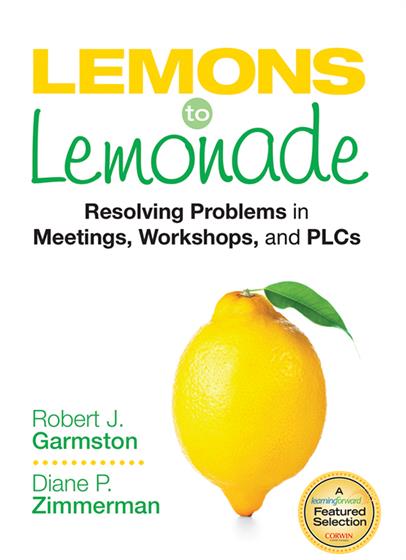About the Authors
Introduction
To Intercede Is To Lead
Why Read This Book
Problem Locater
Chapter 1. The Novice to Expert Journey
We All Begin as Novices
Accomplished Means Competent
Uninformed
Novice
Proficient
Accomplished
Highly Accomplished Expert
Proficiency Scale
Attributes of the Expert
Chapter 2. Building Personal Confidence
Connecting Mind and Body
1. Breathe
2. Try Progressive Relaxation
3. Walk
4. Center Yourself Physically
5. Over Prepare. Over Prepare
6. Address the Stress of Conflict
7. Check Your Negative Predictions at the Door
8. When Stuck, Move
9. Maintain Your Identity as a Facilitator
10. Monitor Your Need to Know
11. Take Care to Arrange the Room
12. Create a "Circle of Excellence"
Chapter 3. Intervention Principles
Principles Guide Decisions
1. Compassion
2. Precise Language
3. Congruence
4. From Low to High Risk
Chapter 4. Deciding to Intervene
Establish Meeting Standards
Set Working Agreements
Evaluate Working Agreements
Clarify Tasks
Intervene as Necessary
Deciding to Intervene with an Ad Hoc Group
Intervening Preemptively
1. Is the Agenda Relevant?
Plan the Beginning
Cluster Reports
Mix Strategies
2. Is Engery Waning?
Around the Room and Back Again
Card Partners
The Card Stack and Shuffle
3. Are Emotions Ratcheting Up?
First Turn/Last Turn
4. Might the Group be Heading Toward Conflict?
Grounding
Deciding When to Intervene
1. Is Intervening Important?
2. Am I the Best Person to Intervene?
3. Are My Observations Accurate?
4. Will It Be Quick or Take Time?
5. Can the Group Learn From It?
Chapter 5. Common Group Issues
Getting Attention
Attention First
Refocusing
Common Signal
Physical Proximity
Verbal Proximity
Redirecting Engagement
Join a Whole Table That is Off Task
Refocus Serial Storytelling
When Workflow is Hampered
Address a Refusal to Follow Directions
Assist with Difficulty Transitioning
Address Uneven Finishes with Group Work
Engergize a Quiet Group
Managing Your Emotions
Positional Thinking--Power Struggles
From Positions to Interest
Chapter 6. Managing Common Challenges
Low Engagement
Knitters
Non-participants
Daydreamers
Silent Participants
Frowners
Distracteds
Distruptive Group Members
Broken Records
Long-winded Speakers
Humorists
Inappropriate Humorists
Latecomers and Early Leavers
Resisters
Side Talkers
Know-It-Alls
Monopolizes
Misinformants
Interrupters
Subject-Changers
Cell Phones and Texting
Chapter 7. Strategies for Advanced Facilitation
1. Group Conflict
Grounding
Existing State--Desired State
2. Demoralizing External Events
Desired State
Third Point
Redirect Resistance
Pace and Lead
Structured Interviews
3. Disputes
Stop the Dispute Early
Verbalize the Issue
Acknowledge Each Position
Identify the Sources of Information
Check Perceptions
Reframe the Conflict as an Asset
4. Dissenting Views
Paraphrase Partner
Pace the Emotion
Redirect the Attack
Reframe the Opposition
Help Groups Utilize Styles
Assumptions Wall
Brainstorm Questions
Disperse to Agree
5. Personal Attacks
The Six-Step Response
Step Between Opposing Members
Change the Narrative
Enlist the Group in Solving the Problem
6. Challenges to the Leader
Process Commercial
Engage With More Intensity
Engage With Less Intensity
Request Civility
7. Subgroup Manipulation
Decision Matrix
Values Decision Matrix
Require a Quorum
Pace, Lead and Poll
One-Minute Advocacy
Alternate Microphone Advocacy
8. Sabotage
9. Irresolvable Conflict
Polarity Management




